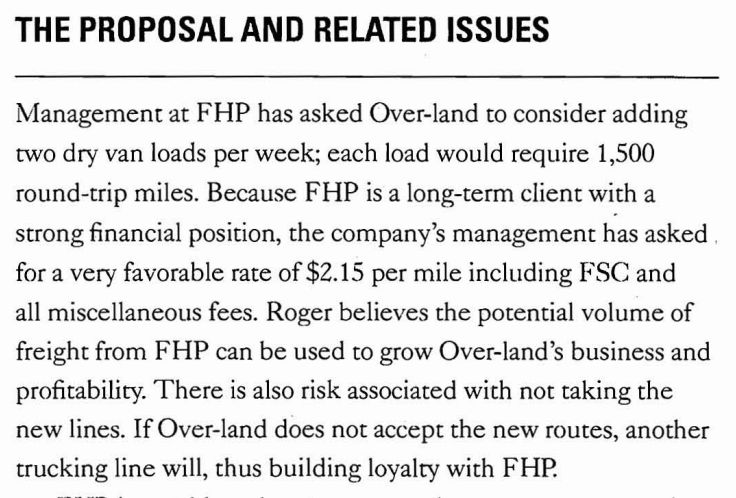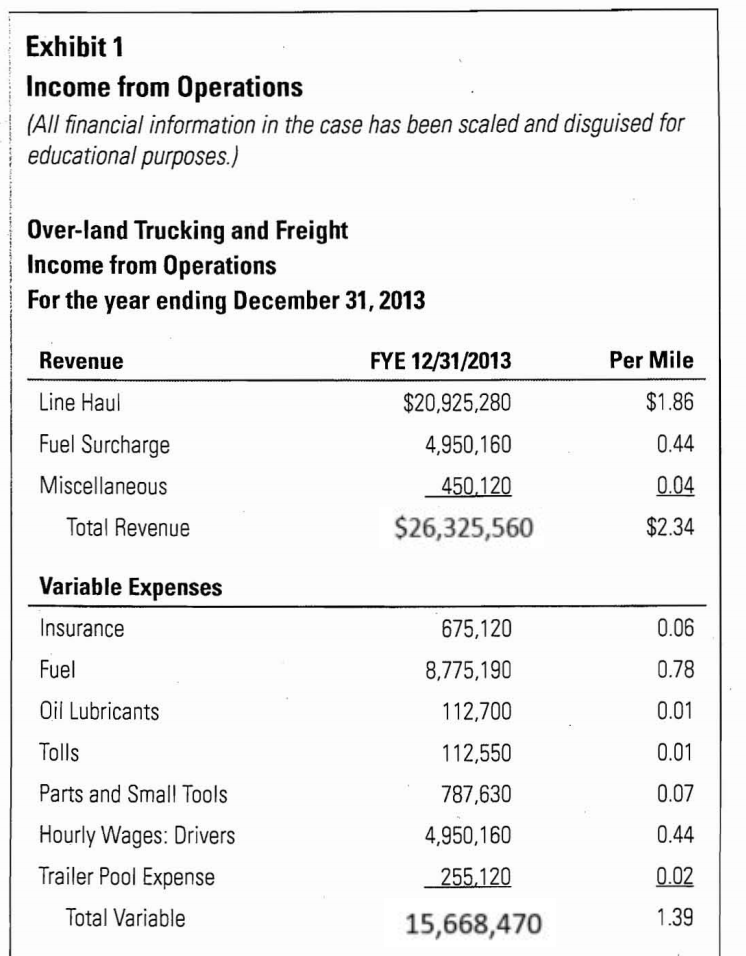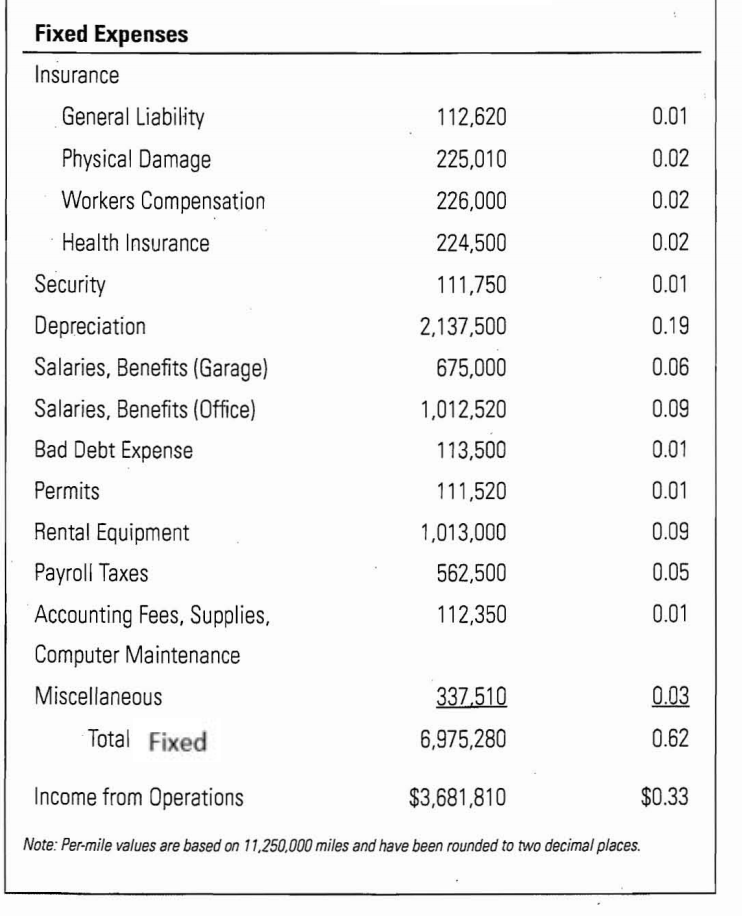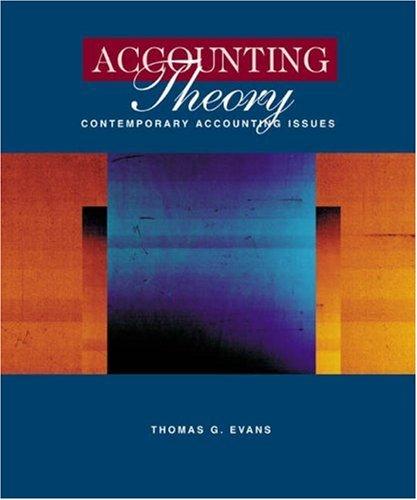- Over-land can increase capacity in different ways to accommodate the additional loads if they accept FHPs contract. Why might Over-land use an independent operator (variable cost of $65/mile) over purchasing a rig and hiring a driver for a lower variable cost ($1.39/mile)? Calculate at what point (in miles) Over-land would be indifferent between purchasing a new rig and using an independent operator.
- The case references J.B. Hunt and Landstar as two publicly traded companies that have two very different cost structures. This is true because the companies practice two different philosophies for using (or not using) independent operators. Speculate about the company that may produce higher profits in periods of high economic demand. Speculate about the company that may have a less risky cost structure in poor economic times.
- Besides using independent operators or purchasing an additional truck, what options does Over-land have to increase their capacity and potentially accommodate the FHP contract? Discuss the overall risks to a company with having too much or too little capacity.
- What should Over-land do?? If you were advising Over-land on what to do relative to FHPs two additional routes, what would you advise, and why?
-



THE PROPOSAL AND RELATED ISSUES Management at FHP has asked Over-land to consider adding two dry van loads per week; each load would require 1,500 round-trip miles. Because FHP is a long-term client with a strong financial position, the company's management has asked, for a very favorable rate of $2.15 per mile including FSC and all miscellaneous fees. Roger believes the potential volume of freight from FHP can be used to grow Over-land's business and profitability. There is also risk associated with not taking the new lines. If Over-land does not accept the new routes, another trucking line will, thus building loyalty with FHP. Exhibit 1 Income from Operations (All financial information in the case has been scaled and disguised for educational purposes.) Over-land Trucking and Freight Income from Operations For the year ending December 31, 2013 Revenue FYE 12/31/2013 Per Mile $1.86 0.44 Line Haul Fuel Surcharge Miscellaneous Total Revenue $20,925,280 4,950,160 450.120 $26,325,560 0.04 $2.34 Variable Expenses 0.06 0.78 Insurance Fuel Oil Lubricants Tolls 0.01 0.01 675,120 8,775,190 112,700 112,550 787,630 4,950, 160 255,120 15,668,470 0.07 0.44 Parts and Small Tools Hourly Wages: Drivers Trailer Pool Expense Total Variable 0.02 1.39 Fixed Expenses 0.01 Insurance General Liability Physical Damage Workers Compensation 0.02 0.02 0.02 0.01 0.19 112,620 225,010 226,000 224,500 111,750 2,137,500 675,000 1,012,520 113,500 111,520 1,013,000 562,500 0.06 0.09 Health Insurance Security Depreciation Salaries, Benefits (Garage) Salaries, Benefits (Office) Bad Debt Expense Permits Rental Equipment Payroll Taxes Accounting Fees, Supplies, Computer Maintenance Miscellaneous 0.01 0.01 0.09 0.05 112,350 0.01 337,510 0.03 Total Fixed 6,975,280 0.62 Income from Operations $3,681,810 $0.33 Note: Per-mile values are based on 11,250,000 miles and have been rounded to two decimal places. THE PROPOSAL AND RELATED ISSUES Management at FHP has asked Over-land to consider adding two dry van loads per week; each load would require 1,500 round-trip miles. Because FHP is a long-term client with a strong financial position, the company's management has asked, for a very favorable rate of $2.15 per mile including FSC and all miscellaneous fees. Roger believes the potential volume of freight from FHP can be used to grow Over-land's business and profitability. There is also risk associated with not taking the new lines. If Over-land does not accept the new routes, another trucking line will, thus building loyalty with FHP. Exhibit 1 Income from Operations (All financial information in the case has been scaled and disguised for educational purposes.) Over-land Trucking and Freight Income from Operations For the year ending December 31, 2013 Revenue FYE 12/31/2013 Per Mile $1.86 0.44 Line Haul Fuel Surcharge Miscellaneous Total Revenue $20,925,280 4,950,160 450.120 $26,325,560 0.04 $2.34 Variable Expenses 0.06 0.78 Insurance Fuel Oil Lubricants Tolls 0.01 0.01 675,120 8,775,190 112,700 112,550 787,630 4,950, 160 255,120 15,668,470 0.07 0.44 Parts and Small Tools Hourly Wages: Drivers Trailer Pool Expense Total Variable 0.02 1.39 Fixed Expenses 0.01 Insurance General Liability Physical Damage Workers Compensation 0.02 0.02 0.02 0.01 0.19 112,620 225,010 226,000 224,500 111,750 2,137,500 675,000 1,012,520 113,500 111,520 1,013,000 562,500 0.06 0.09 Health Insurance Security Depreciation Salaries, Benefits (Garage) Salaries, Benefits (Office) Bad Debt Expense Permits Rental Equipment Payroll Taxes Accounting Fees, Supplies, Computer Maintenance Miscellaneous 0.01 0.01 0.09 0.05 112,350 0.01 337,510 0.03 Total Fixed 6,975,280 0.62 Income from Operations $3,681,810 $0.33 Note: Per-mile values are based on 11,250,000 miles and have been rounded to two decimal places









